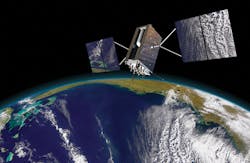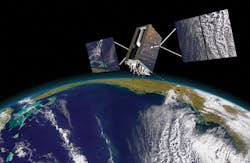Lockheed Martin to improve GPS IIIF navigation satellite accuracy and reliability
LOS ANGELES AFB, Calif. — Navigation satellite designers at Lockheed Martin Corp. are moving forward with the nation’s latest satellite navigation spacecraft — the Global Positioning System (GPS) Block IIIF.
Officials of the U.S. Air Force Space and Missile Systems Center at Los Angeles Air Force Base, Calif., have announced a $1.4 billion contract to the Lockheed Martin Corp. Space Systems Co. in Littleton, Colo., for costs related to the GPS IIIF satellites — including options to build as many as 22 GPS IIIF spacecraft in future years.
The GPS IIIF satellites will be the most sophisticated spacecraft in the GPS constellation. The Air Force already is working with Lockheed Martin to build GPS III Block A satellites, the first of which is set for launch this December.
The GPS III satellites will replace aging on-orbit GPS spacecraft, and will improve satellite navigation accuracy, as well as GPS ability to resist attempts to jam their signals to degrade or disable the system’s capability. The existing GPS satellite constellation has been operating in orbit since 1995.
Lockheed Martin is designing the new generation of GPS navigation satellites with improved accuracy and reliability
This GPS IIIF contract to Lockheed Martin includes non-recurring engineering, space vehicle test bed and simulators, production of GPS IIIF satellites 11 and 12, options to build as many as 22 GPS III space vehicles, as well as satellite storage, launch, and on-orbit support.
The GPS-III satellites also will extend each satellite’s design life and add a new civil signal that is interoperable with international global navigation satellite systems. Air Force leaders plan to buy as many as 32 GPS III satellites.
The GPS III program is part of a U.S. positioning, navigation, and timing (PNT) upgrade. The new GPS III constellation will have 500 times the transmission power of the existing GPS system, and will have faster clock update rates.
GPS Block IIIA will have the first 10 GPS III satellites, which will be used to keep the Navstar Global Positioning System operational. GPS IIIF, meanwhile, is the second set of GPS III satellites, and will have 22 space vehicles.
The GPS IIIA satellites will have a fourth civil signal on L1 channel, enhanced reliability, accuracy, and integrity, no intentional signal degradation for national security (also called selective availability), and a 15-year life span. The GPS IIIF satellites will have all the GPS IIIA features, including laser reflectors and search-and-rescue payloads.
The enhanced reliability and anti-jam features of the GPS III satellites are expected to benefit U.S. and allied military forces, which increasingly rely on satellite-guided munitions, as well as civilian agencies and private business. U.S. and European aviation authorities have big plans to base future commercial aircraft navigation and guidance on signals from the GPS and other satellite-based positioning systems.
Future upgrades to GPS IIIF satellites could include cross-linking capabilities and spot beams to enable operators to boost the power of satellite signals so that the spacecraft can provide reliable service even in difficult or degraded conditions.
GPS IIIF satellites may receive upgrades with spacecraft numbers 1 to 6, more upgrades with satellites 7 to 12, upgrades in satellites 13 to 18, and additional upgrades in satellites 19 to 22.
The GPS III team is led by the Global Positioning Systems Directorate at the Air Force Space and Missile Systems Center. Lockheed Martin is the GPS III prime contractor with teammates Harris Corp. (formerly Exelis), General Dynamics, Infinity Systems Engineering, Honeywell, ATK, and other subcontractors.
Air Force Space Command’s 2nd Space Operations Squadron (2SOPS), based at Schriever Air Force Base, Colo., manages and operates the GPS constellation for civil and military users. On this contract Lockheed Martin will do the work on GPS IIIF in Littleton, Colo., and should be finished by August 2027.
For more information contact Lockheed Martin Corp. Space Systems online at www.lockheedmartin.com, or the Air Force Space and Missile Systems Center at www.afspc.af.mil.

